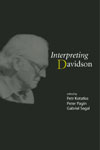

|
|
|
|

Interpreting DavidsonDonald Davidson is arguably the most important and influential philosopher of mind and language of the latter half the twentieth century. In the nineteen sixties and seventies his articulation and defense of a position he called "anomalous monism" set new agendas in the philosophy of mind. Anomalous monism shows how mental events and processes can be bona fide occupants of the physical world, while retaining their autonomy and sui generis nature. At the same time, his new approach to the concept of linguistic meaning, coupled with technical and methodological insights into semantics for natural languages, initiated new research programs in the philosophy of language. In spite of the apparently disparate nature of these two early achievements, Davidson's philosophy forms a systematic whole, weaving together distinctive positions in metaphysics, philosophical logic, epistemology and the philosophy of science. Themes that have become prominent in his later philosophy include the rejection of empiricism as a theory of epistemic intermediaries, intersubjectivity as a condition for mental content and the nature and definability of truth. Interpreting Davidson collects original essays on Davidson's work by some of his leading contemporaries, including Pascal Engel, Paul Horwich, Ernie LePore, John McDowell, Stephen Neale and Bjørn Ramberg. Davidson himself contributes a reply to each essay as well an original paper of his own. The essays cover a wide range of venerable philosophical themes such as: skepticism about the existence of the external world; the nature of perceptual experience and its role in the foundations of knowledge; the grounding of meaning and normativity in the physical world; logical form; the nature of truth and what there is; intersubjectivity and mental content. While there have been other collections of essays centering on Davidson's work, this one perhaps covers the widest range of issues, and it is unique in its focus on his mature philosophy. is head of the department for the Philosophy of Language and Philosophy of Science at the Philosophical Institute of the Czech Academy of Sciences. is a professor in the department of Philosophy at Stockholm University. is a reader in Philosophy at King's College in London. Contents
8/1/2001 ISBN (Paperback): 1575863561 (9781575863566)
Subject: Donald Davidson; Philosophy
|
Distributed by the
University of Chicago Press |
|
pubs @ csli.stanford.edu
|
CSLI Publications
Stanford University Cordura Hall 210 Panama Street Stanford, CA 94305-4101 (650) 723-1839 |